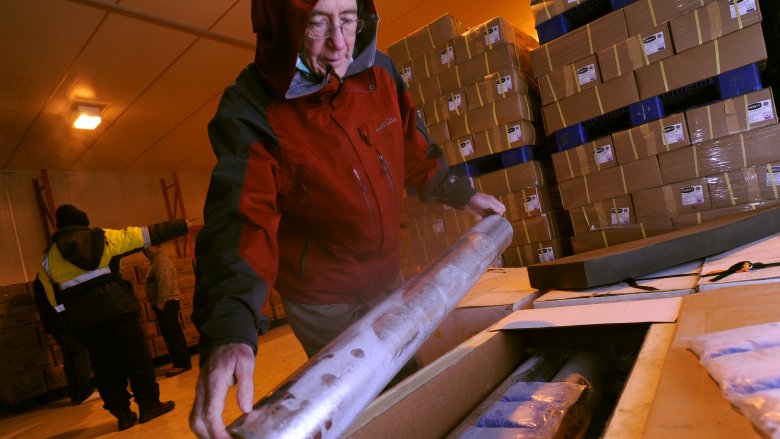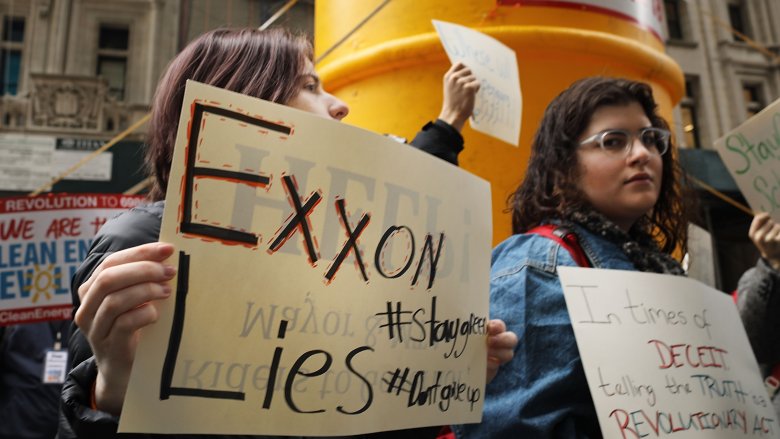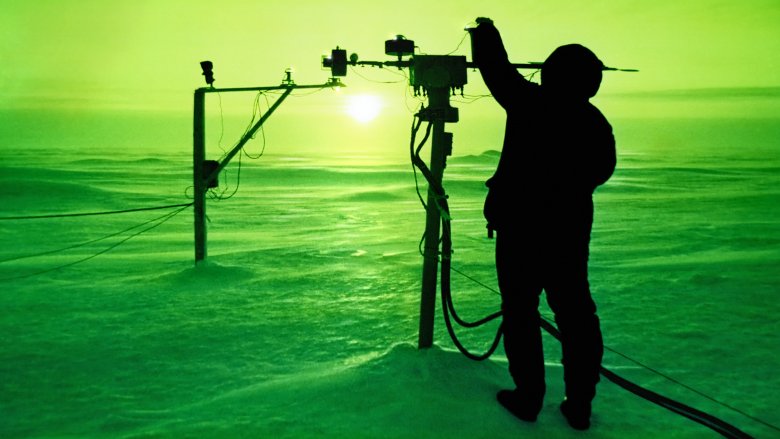The Untold Truth Of Climate Research
There are a bunch of reasons why climate change hasn't been fixed yet, and super-boringness is probably one of them. How much climate change data can the average person look at before nodding off into a plate of scrambled eggs? Probably not much, depending on how many charts, graphs, and dreary spokespeople are involved. In the interests of both entertainment and education, here are a few actually-fun facts about climate change research that (mostly) don't include charts, statistics, or Al Gore.
Climate change was so totally not invented by the Chinese
Actually, climate change was invented by the Greeks, or rather prophesied by the Greeks, who, as it turns out, did more than just sit around in togas eating grapes. According to the American Institute of Physics, a dude named Theophrastus (who was a student of Aristotle) actually started paying attention to what happens when humans muck around with nature — a rather remarkable accomplishment when you consider that the ancient Greeks practically invented weapons of mass destruction, so didn't otherwise seem overly perturbed by the idea of environmental devastation.
In particular, Theophrastus noticed that drained marshlands seemed to make adjacent lands more susceptible to freezing, which made him wonder if similar things might happen with other human-altered landscapes. In particular, he speculated that deforestation might make local temperatures rise, and he was right — deforestation can alter a region's cloud cover, causing not only a decrease in rainfall but an increase in temperature. Of course, the part he didn't seem to consider was the compounding global effect that deforestation might have, which is too bad for us 2,000 years later. Although let's face it, without a toga-wearing, grape-eating version of Al Gore to help spread the word, no one probably would have paid much attention anyway.
Modern climate science is way older than Al Gore
We've really only been hearing noise about climate change for the past few decades, but that doesn't mean it's a new science. In fact, climate science goes back more than 150 years, to the pre-Al Gore era of telegraphs, train-jackings, and the invention of paper bags. According to NASA, the idea that certain gases were capable of trapping heat was first put forth by John Tyndall (who incidentally was also the guy who invented the fireman's respirator). Tyndall's research showed that water vapor, carbon dioxide, and ozone absorbed hot air just like politicians on the campaign trail, which led him to theorize that all that hot air in the atmosphere might eventually make the world start to feel uncomfortable. Coincidentally, campaigning politicians blowing hot air have always had the same ability.
The Cold War was good for climate research
Unless you were alive during the Cold War and spent half your childhood cowering under your school desk while nuclear attack sirens blared, you can look back on the era secure in the knowledge that it was good times — for climate research, anyway. According to Climate News Network, the first research into the changing climate in Arctic regions like Greenland was carried out not because researchers particularly cared about rising sea levels or polar bears, but because of the U.S. military. They wanted to know how the changing atmosphere might impact high-altitude missiles or whether the sounds made by melting icebergs might interfere with a submarine's ability to spy on the Russians.
By the late 1930s, there was just one guy, an amateur scientist named G.S. Callendar, who believed human activity might be contributing to a warming climate. Scientific American says no one really took him seriously, though, until a decade or so later when the military got a bunch of cash and decided to find out if he was right, mostly so they could answer more questions about how climate change might affect missiles and submarines. Because nothing says "love for Mother Earth" quite like sticking it to the enemy.
Early climate researchers thought global warming was totally cool
It's one thing to understand the processes behind climate change and quite another to understand the implications — as it turns out, many early climate scientists were a-okay with the idea that the planet might be warming up. According to The Guardian, in 1938 G.S. Callendar closed his landmark paper "The artificial production of carbon dioxide and its influence on temperature" with the words, "It may be said that the combustion of fossil fuel, whether it be peat from the surface or oil from 10,000 feet below, is likely to prove beneficial to mankind in several ways." He then went on to foretell a future where crops could be grown "above the northern margin of cultivation," and where the return of ice-age glaciers could be postponed, at least for as long as humans continued to pump all that beneficial carbon dioxide into our robust atmosphere. Yay, science.
Who cares, it's going to take a few thousand years anyway
There were almost certainly a few scientists who thought to themselves, "Hmm, maybe climate change could actually be bad," but most of them didn't believe anyone would need to care for at least an eon or two. Maybe they figured that people would be wearing silver space suits by then and the food would come out of nutrient-generating supercomputers. According to Science Poles, the slow-climate change myth didn't start to unravel until the mid-1960s, when a Danish paleoclimatologist named Willi Dansgaard looked at ice and sediment core samples taken from the bedrock beneath the Greenland Ice Sheet. Dansgaard and his team were alarmed to discover that climate change could not only happen across millennia but could also happen (and had happened) over a matter of decades. It was Dansgaard's research that first made politicians sit up and take notice, which ultimately started the modern conversation about global warming.
Exxon pioneered modern climate research
Yes it's true, Exxon, spiller of oil, exploder of refineries, was once concerned about climate change, or at least seemed to be. According to Inside Climate News, in the mid-1970s, one of Exxon's senior scientists warned the company that carbon dioxide from the burning of fossil fuels was a major contributing factor to global climate change. At first, Exxon almost seemed to give a couple rats' behinds — one manager even wrote, "This may be the kind of opportunity that we are looking for to have Exxon technology, management, and leadership resources put into the context of a project aimed at benefitting mankind."
And they didn't end things there, either. They budgeted over $1 million for climate research. They developed sophisticated climate models. They noted the implications: an average warming of 3 degrees Celsius and "significant changes in the earth's climate, including rainfall distribution and alterations in the biosphere." They hugged trees. They held hands with Greenpeace and sang "We are the World." (Actually not those last two things, but you get the idea.) They even published their findings in several peer-reviewed journals. Their work was considered important enough that the Department of Energy praised them for their "very responsible action." And then...
'Just kidding'
In 1988, a New York Times headline declared, "Global Warming Has Begun, Expert Tells Senate," and it suddenly occurred to someone, somewhere in the company that maybe all this climate change stuff was bad for the company's bottom line. According to Inside Climate News, the backpedaling began shortly thereafter, prompting Exxon's chairman and CEO to declare, "Currently, the scientific evidence is inconclusive as to whether human activities are having a significant effect on the global climate." (Sound familiar? In 1971, Gareth Davis of Imperial Tobacco said pretty much the same thing about cigarettes: "We don't know. Smoking may or may not kill, but we don't know.")
No one is really sure why Exxon — which hadn't exactly spent the last decade and a half lurking around in the shadows with secret doom-foretelling documents hidden under a black cloak — suddenly thought no one would remember what they'd once said about climate change. But by the time the Clinton/Gore years rolled around, they'd evidently unbelieved everything they'd once believed about benefiting mankind, being responsible, and holding hands with Greenpeace. As Inside Climate News reported, their open campaign against climate research included harassing climate policy officials and openly mocking climate scientists and their predictions, and they haven't grown up much since then. In 2015, Exxon's latest CEO used the whole "needs more research" non-argument and then the company followed up by complaining that they didn't have the resources to do more research. Yes, there's the Exxon we've all come to know and loathe.
The global cooling myth
Science deniers are nothing if not innovative. In the early 1970s, a rumor swept the media that the planet was not, in fact warming, but the opposite — an ice age was coming! No longer did we have to fear extended droughts and killer storms, but White Walkers and extended annual ski seasons. According to Daily Kos, the myth was cleverly perpetuated by climate skeptics, who took actual scientific papers and reported their findings totally out of context. In 1972, former Energy Secretary James Schlesinger used this quote from a National Science Board report to argue against the possibility of global warming: "Judging from the record of past interglacial ages, the present time of high temperatures should be drawing to an end ... leading into the next glacial age." Of course he left out the bit right afterward: "However, it is possible, or even likely, that human interference has already altered the environment so much that the climatic pattern of the near future will follow a different path."
Schlesinger's op-ed piece and others like it were the basis of the "global cooling" myth that led many people to fear encroaching glaciers rather than melting ones, and it turned out to be patently untrue — to the ultimate disappointment of the White Walkers and most of the people in the winter sports industry.
Most Americans don't think there's a scientific consensus on climate change
According to the journal Theoretical and Applied Climatology, 97 percent of scientific papers that discuss global warming agree that climate change is real and that human activity is a major contributing factor. Just to put that into perspective, that figure is pretty similar to the scientific consensus about human evolution, the big bang theory, and whether or not eating vegetables is good for you.
The problem really appears to be a failure to communicate. Despite the clear scientific consensus about climate change, the Yale Program on Climate Change Communication reports that almost no Americans — just 13 percent — think there's a clear scientific consensus about climate change. It's hard to say what has contributed to this disconnect, though the media's love of "fair and balanced" reporting has probably given a disproportionate voice to that 3 percent of scientific dissenters. According to Alan Leshner of the American Association for the Advancement of Science, the problem also lies with scientists themselves and their ability (or rather inability) to communicate controversial science to the public. Which isn't too surprising when you consider that there are plenty of people who also don't seem to have heard the controversial message that vegetables are good for you.
Our brains are programmed to be apathetic about climate change
Our ancestors ran from saber-toothed tigers and forest fires, not slow-melting icebergs and vanishing coastlines. If it doesn't have teeth, claws, or the potential to immediately destroy us, human beings tend to shrug. According to Nobel Prize winner Daniel Kahneman, the problem is also related to uncertainty — people don't like to make decisions about problems that have unpredictable outcomes. While a saber-toothed tiger is a pretty immediate and certain threat (back when it actually existed), climate change is not only slow-moving but uncertain, kind of like a bulldozer sitting at a crossroads seven or eight miles from your house. Despite the consensus that climate change is happening and that humans are causing it, we don't really know how much warming will occur, what sort of technology might stop it or what the ultimate fate of humanity will be if it's allowed to continue. The only thing that's really certain about the future of climate change is that it doesn't bite, scratch, or burn, which means that for most people it seems a whole lot less pressing than making sure the DVR is set to record the next season of The Walking Dead.
Money got us into this, and money may get us out again
Money doesn't actually make the world go 'round, but it does make the sun hotter, the hurricanes fiercer, and the coastlines smaller. No one can really deny that the human desire to earn money, save money, and spend money is the ultimate root of most of our climate woes, but there is some hope that greed might actually be working in our favor. According to Forbes, for example, in December 2016, Walmart announced that it was going to cut $1 billion in fuel expenses, invest in alternative energy, and cut 1 gigaton of carbon from its supply chain in the next 15 years.
Now, everyone knows that Walmart kind of has a reputation as a corporate bad guy, so what does this do for them? It helps soften their image, of course. Who could possibly fail to love a Walmart that's all about cheap prices and reduced carbon emissions?
Of course, it's not just Walmart proving to the world that there's money to be made fighting climate change — alternative energy is only going to get cheaper, which means that our money-loving selves will have more incentive to embrace it. So as long as the world remains greedy, there may be hope for us yet. Now you can go tell your mom how wrong she was about the whole having and eating your cake thing, whatever that was.










